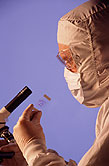
THURSDAY, Dec. 24 (HealthDay News) — A lipid found in the lungs appears to have the ability to prevent infection with respiratory syncytial virus (RSV), which is a major cause of infection in babies and can also be dangerous for adults with chronic lung diseases and conditions such as HIV, researchers report.
The lipid, known as POPG, seems to help the lungs do a better job of keeping irritants out, according to the new study.
“Our findings demonstrate that POPG is a potent antiviral agent both as a prophylactic and after infection has occurred,” said study co-author Dennis Voelker, a professor of medicine at National Jewish Health in Denver. “While these are still early studies, several characteristics of POPG make me believe that it has real potential as both an antiviral and anti-inflammatory treatment.”
POPG — palmitoyl-oleoyl-phosphatidylglycerol — is found in the fluid that lines the lungs’ air sacs. Researchers think they’ve figured out how it works, and in the new study, they report that it prevents RSV infection in the laboratory.
“Our findings suggest that supplemental POPG may have significant potential for preventing RSV infections in vulnerable human populations and treating infections after they become established,” the study authors wrote in their report published in this week’s issue of the Proceedings of the National Academy of Sciences.
Voelker and colleagues next want to figure out whether POPG may be an effective treatment for other germs, such as those that cause flu.
More information
For more about respiratory syncytial virus, visit the U.S. Centers for Disease Control and Prevention.

